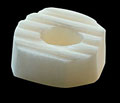Responding to the ICIJ’s investigation into the human tissue trade, a team of reporters of the Asahi Shimbun, a daily newspaper in Japan, has investigated how human tissue has been used in Japan.
The Japanese government has approved only a few cases as proper medical products such as skin sheets all of which are made from Japanese tissues.
Moreover, the Japanese Society of Tissue Transplantation has guidelines for the use of human tissue for transplants. The guidelines are as strict as those for approved pharmaceutical products and as a result, tissue banks in Japan only handle those from Japanese donors whose identities have been confirmed.
However, in medical treatment cases outside of the national health insurance program, there are no limits on doctors importing from abroad medical materials made from human tissue for treatment of patients. There are also no laws in Japan for controlling use of human tissue, such as skin and bones.
Unlike organs, such as the heart and lungs, which are strictly regulated under the Law on Organ Transplantation, there is no ban on the buying and selling of human tissue. Under the current situation, the health ministry cannot accurately estimate the extent of, or even know, if there is the import of such tissue from abroad.
Soichiro Kitamura, a president emeritus of the National Cerebral and Cardiovascular Center who is knowledgeable about tissue transplants, said, “While there will continue to be a need for human tissue in future treatment of burn patients, for example, there will also be a need to prevent the use of human tissue from abroad for which the origins are unclear. Legal revisions should be made so regulations conform to the Law on Organ Transplantation.”
Nobuya Sawa is an Asahi Shimbun Staff Writer.
![]() Subscribe to The ICIJ Global Muckraker by email or get the RSS feed
Subscribe to The ICIJ Global Muckraker by email or get the RSS feed

